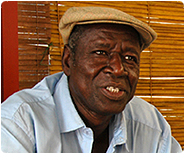|
|
 |
 Like a Lone Troubadour at the Crossroads, African Bluesman Boubacar Traoré is Back with New CD and Fall 2005 Tour
Like a Lone Troubadour at the Crossroads, African Bluesman Boubacar Traoré is Back with New CD and Fall 2005 Tour
If his compatriot Ali Farka Toure evokes the sun-struck Delta ambiance of John Lee Hooker, Boubacar Traoré has more in common with Robert Johnson’s fatalistic, dark-side-of-moon brand of sorcery. Like a lone troubadour at the crossroads, his storytelling is veiled in a complex, occult shade of indigo rather than plain blue. His keening voice is at once primal and seductive, steeped in tragedy but starved for life, and he wields his exquisite, kora-inflected guitar like a talisman again fate. But on Kongo Magni on World Village (Harmonia Mundi)—whose September 13 release will be accompanied by a 13-city tour—Boubacar’s realistic, if pessimistic, view of life and its struggles is finally granted a fragile silver lining. Although humanity is stalked by war and famine and daily life is marred by petty jealousies, God is nonetheless in his heaven and new children are born to take up the struggle. Accompanied by an empathetic small combo in which accordion and harmonica swirl around earthily resonant kamele ngoni (young person’s harp), balafon (xylophone) and traditional drums, shakers, and other percussion, Boubacar is revealed as philosophical, lyrical, resigned, guardedly hopeful, and gloriously human.
Singer-composer-guitarist Boubacar Traoré was born in Kayes, Mali in 1942 and his fascination with the Khassonke traditions of his homeland began early. Boubacar used to secretly use his older brother’s guitar but one day he was caught. His brother had been studying music in Cuba, and was in fact a member of a group that was to become the famous Maravilas de Mali, performing in the trendy Latin style. After hearing his younger brother play he told him it was the most beautiful music he had ever heard, and predicted he would become famous one day.
Following a stint as a football hero—his nickname of “Kar Kar” was bestowed by appreciative sports fans—he first achieved stardom during the ’60s, when his “Malian Twist” hit the airwaves. “For years, all of Mali woke to this song on the radio. It was a call to Malians throughout the world to return home and help build their country,” explains travel writer Lieve Joris—who wrote a book about Traoré called Mali Blues. “That was just after independence, in 1963. Kar Kar, blouson noir they called him, because he wore a leather jacket like Johnny Halliday and Elvis Presley.”
Though Boubacar comes from a place known for its griots (oral historians), he is not from that caste, which means that he is free to sing about anything. It also entailed that in spite of being famous, he was not able to afford to buy his own cigarettes, and after a few years of Bohemian life he decided to go back to his hometown, have a regular job and a family, and all but disappeared from the limelight.
In the years that followed Boubacar worked hard as a tailor, farming sorghum and peanuts, and tending to sheep. His wife Pierrette gave birth to eleven children—though only six survived. Two of their children died in the same week. Both the trials and loves of Kar Kar’s life and his country are the subject of many of his songs—ripe topics for any blues singer.
In 1988, some journalists stumbled upon Kar Kar and convinced him to perform again. When he was heard on Radio Mali, people thought he was an impostor, since he had been believed dead for many years. But the truth prevailed and Kar Kar was once again a national star. Soon after, Kar Kar’s wife suddenly died. He was devastated and once again dropped from the public eye. This time he left for France to make enough money to support his children and disappeared among the Malian expatriate community in Paris. Kar Kar’s music could not be hidden for long though. In recent years his music has received critical acclaim in Europe and America.
The five magnificent albums he has released since have made him a much-in-demand headliner world-wide. With a book about him (Mali Blues by Lieve Joris) already in print and a documentary retrospective (Je Chanterai Pour Toi, directed by Jacques Sarasin and produced by Jonathan Demme) about to be issued on DVD, 2005 is shaping up to be Boubacar’s watershed year.
|
|
 |
|
|
|